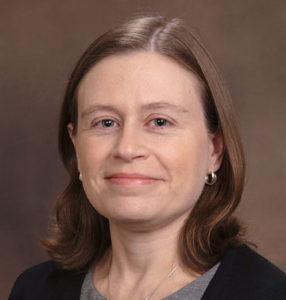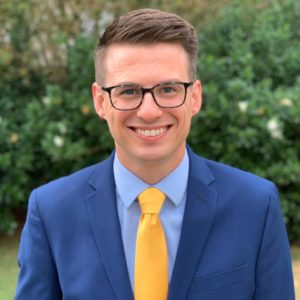Seminarian Michael Lasater-Sizemore’s dream was to be called to church ministry.

Michael Lasater-Sizemore
And he was – by Benson Baptist Church in Benson, North Carolina, on March 25. But never could he have foreseen it happening remotely due to the social distancing imposed by the COVID-19 pandemic.
“I had no idea what to think,” said Lasater-Sizemore, a master-of-divinity student at Campbell University Divinity School in Buies Creek, North Carolina. “I was scared and I’m kind of surprised they voted by Zoom.”
Scared, maybe, but Lasater-Sizemore is by no means complaining that the congregational vote calling him as minister of youth and children occurred online. He started his new position at Benson – also virtually – on March 30.
“I’m more thankful and grateful that they wanted to continue on with it,” he said.
But interviewing and hiring church staff in the age of the coronavirus involves much more than hopping onto Zoom or other virtual meeting spaces, said Laura Stephens-Reed, a clergy and congregational coach based in Moulton, Alabama.
“Searches are going to be a lot more difficult and they’re going to have to be done in different ways,” she said.

Laura Stephens-Reed
Where a church is in the process of calling a new minister, the state of its finances and the current social and economic uncertainties must be factored into any search, Stephens-Reed said.
Another challenge is making those crucial personal connections with candidates when the only available face-to-face interaction is virtual, she said.
“When you go to meet a congregation in view of a call, you get to meet the people and get a sense that feeds into discernment as to whether this is the right fit,” Stephens-Reed said. “It’s hard to get that same read on chemistry virtually.”
Benson was fortunate to have hosted Lasater-Sizemore for visits before social distancing limitations went into effect, Pastor Lawrence Powers said.
Otherwise, the congregation may not have moved forward with the vote, he added.
“I think it was helpful that we had literally done everything except for the vote,” Powers said.

Lawrence Powers
They went forward with the process to ensure youth and children are ministered to in this challenging environment, Powers said.
“There was an overwhelming sense that we needed someone to kind of make sure that the spiritual formation and growth of the youth and children still happened during this time,” he said.
Lasater-Sizemore had a 30-minute meeting with the youth and children at Benson and a meet-and-greet with parents before COVID-19 prevented in-person gatherings.
While he hadn’t met everyone, it was enough for 45 church members to vote unanimously to call Lasater-Sizemore.
So far, the young minister has only worked one day in his office and he hasn’t been introduced to, or spoken in front of, the entire congregation.
He records weekly video services that are viewed by youth and children at home.
“He’s a staff minister that hasn’t actually met the church that he’s ministering with and for,” Powers said. “Taking on a role – and knowing that it can be multiple months before you actually stand in front of the whole congregation – I imagine can be frustrating.”
Lasater-Sizemore made his first appearance before the congregation when conducting the call to worship during virtual worship on April 5.
“It’s tough because ministry is a lot of relationships,” he said. “It’s much harder for me to get to know people and to get to know who they are.”
Lasater-Sizemore said the need for youth and children to connect with friends and people outside of the home is evident.
“It’s important for them to spend time with people and just get them all together to talk and hang out. It’s really important for their mental and emotional health.”
Read more BNG news and opinion on this topic:
#intimeslikethese
